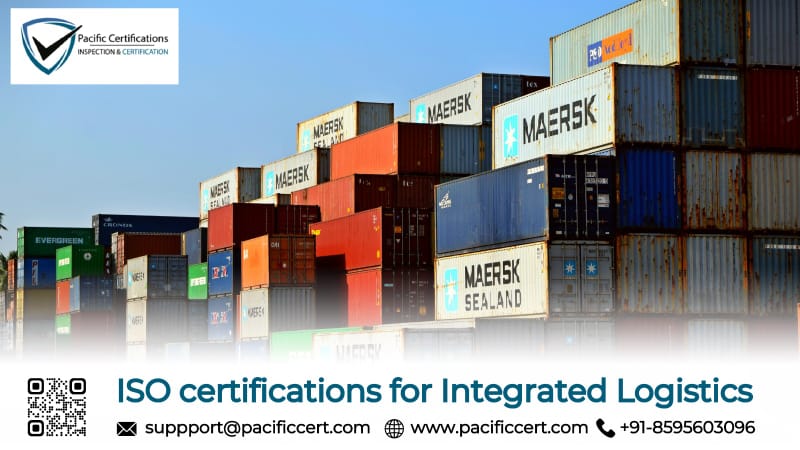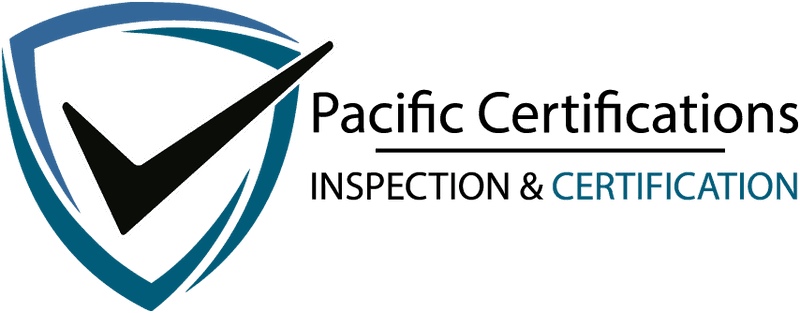ISO Certifications for Integrated Logistics, Requirements and Benefits

Introduction
Integrated logistics providers coordinate complex operations spanning warehousing, transportation management, inventory control, order fulfillment, and last-mile delivery across multi-modal networks involving road, rail, air, and ocean freight. These businesses face critical operational challenges including supply chain security threats from cargo theft and terrorism, transportation safety risks from vehicle accidents and driver fatigue, data security vulnerabilities protecting sensitive shipment and customer information, and business continuity pressures from natural disasters, geopolitical disruptions, and cyber attacks.
ISO certifications are essential for integrated logistics because they provide systematic frameworks ensuring service quality, supply chain security, transportation safety, and operational resilience—all critical for maintaining seamless goods movement and meeting customer delivery commitments. Integrated logistics services encompass freight forwarding and customs brokerage, warehousing with inventory management and order fulfillment, transportation fleet management with route optimization, distribution center operations with cross-docking and consolidation, and technology-enabled supply chain visibility through tracking systems. The industry faces mounting regulatory pressures from customs authorities requiring secure supply chain protocols, transportation departments enforcing vehicle safety and driver qualification standards, environmental agencies mandating emissions reporting, and data protection regulations governing customer and shipment information security.
In logistics, supply chain security and operational resilience determine competitive advantage and customer trust
Quick Summary
ISO certifications provide integrated logistics with internationally recognized frameworks to manage service quality through ISO 9001, supply chain security through ISO 28000, road traffic safety through ISO 39001, information security through ISO/IEC 27001, business continuity through ISO 22301, environmental impact through ISO 14001, occupational safety through ISO 45001, and risk management through ISO 31000.
For more information on how we can assist your integrated logistics business with ISO certifications, contact us at [email protected].
Applicable ISO Standards for Integrated Logistics Businesses
Below are the most relevant ISO standards applicable to third-party logistics providers, freight forwarders, warehousing operators, and distribution center managers:
ISO 9001:2015 (Quality Management Systems)
ISO 9001 enables integrated logistics providers to standardize processes for order management, inventory accuracy, on-time delivery performance, and customer communication ensuring consistent service quality. This universally recognized standard helps organizations implement continuous improvement reducing delays, shipment errors, and customer complaints while demonstrating quality benchmarks essential for winning logistics contracts.
ISO 28000:2022 – Supply Chain Security Management Systems
ISO 28000 is critical for integrated logistics providers protecting cargo from theft, terrorism, sabotage, and counterfeiting throughout transportation and storage networks. This standard establishes risk assessment frameworks, physical security controls including surveillance and tracking systems, personnel security protocols, and incident response procedures that protect goods while expediting customs clearance and border crossings.
ISO 39001:2012 – Road Traffic Safety Management Systems
ISO 39001 addresses transportation safety risks for logistics fleets, establishing systematic approaches to reduce traffic accidents, driver injuries, and fatalities through vehicle maintenance programs, driver qualification and training, route safety analysis, and fatigue management. For logistics operations dependent on road transportation, this standard helps control the leading cause of operational disruptions and liability exposures.
ISO 14001:2015 (Environmental Management Systems)
ISO 14001 helps logistics providers manage environmental impacts from fuel consumption, vehicle emissions, packaging waste, and facility energy use through systematic monitoring and reduction programs. With increasing customer sustainability requirements and regulatory emissions reporting mandates, this standard supports environmental performance improvement while reducing operational costs.
ISO 27001:2022 (Information Security Management Systems)
ISO/IEC 27001 is essential for logistics providers protecting sensitive shipment information, customer data, and proprietary supply chain intelligence from cyberattacks and data breaches. With logistics operations heavily dependent on warehouse management systems, transportation management platforms, and electronic data interchange, this standard provides frameworks for securing digital infrastructure and maintaining stakeholder confidence.
ISO 22301:2019 – Business Continuity Management Systems
ISO 22301 is critical for integrated logistics services supporting just-in-time manufacturing, e-commerce fulfillment, and critical supply chains dependent on uninterrupted goods movement. This standard enables providers to identify potential disruptions including natural disasters, transportation failures, labor strikes, and cyber incidents, then establish recovery strategies maintaining operations within customer-defined service level agreements.
Click here to find out more applicable standards to your industry
What are the Requirements of ISO Certifications for Integrated Logistics Businesses?
Integrated logistics service providers seeking ISO certification must establish and maintain documented policies, procedures, and records aligned with the selected ISO standards. Key requirements include the following:
ISO 28000:2022 – Supply Chain Security Management Systems Requirements
Conduct comprehensive threat and vulnerability assessments identifying security risks throughout transportation routes, warehousing facilities, cargo handling operations, and customs clearance processes
Implement physical security controls including access restrictions for facilities and vehicles, surveillance systems, GPS tracking, tamper-evident seals, and security screening procedures
Establish personnel security protocols including background checks for drivers and warehouse staff, security awareness training, visitor management, and contractor security requirements
Define cargo security procedures covering high-value shipments, dangerous goods, and sensitive materials with special handling protocols and chain of custody documentation
Maintain security incident response plans addressing theft, hijacking, terrorism threats, and unauthorized access with notification procedures and investigation protocols
Conduct security audits of carriers, warehouse partners, and subcontractors ensuring compliance with supply chain security requirements and standards
ISO 9001:2015 – Quality Management Systems Requirements
Document standard operating procedures for order processing, inventory management, picking and packing, shipping, delivery confirmation, and returns handling workflows
Establish key performance indicators monitoring on-time delivery rates, order accuracy percentages, inventory accuracy levels, customer complaint resolution times, and damage rates
Implement quality control checkpoints throughout logistics operations including order verification, shipment inspection, vehicle inspection, and delivery documentation accuracy
Define customer communication protocols providing shipment tracking, proactive delay notifications, delivery confirmations, and responsive support for inquiries and issues
Maintain supplier and carrier qualification processes with performance evaluations, audits, and corrective action procedures for substandard service
Conduct management reviews assessing operational performance, customer satisfaction metrics, process effectiveness, and continuous improvement initiatives
ISO 39001:2012 – Road Traffic Safety Management Systems Requirements
Establish fleet maintenance programs with preventive maintenance schedules, vehicle inspection procedures, tire and brake monitoring, and repair documentation for all transportation assets
Implement driver qualification and training requirements covering licensing verification, defensive driving, hours-of-service compliance, load securing, hazardous materials, and emergency response
Define fatigue management procedures including maximum driving hours, mandatory rest periods, route planning considering distances and conditions, and driver monitoring systems
Conduct route safety assessments identifying high-risk road segments, weather hazards, traffic patterns, and accident-prone areas with alternative routing plans
Maintain incident investigation procedures for accidents, near-misses, and traffic violations with root cause analysis, corrective actions, and lessons learned documentation
Monitor safety performance indicators including accident frequency rates, vehicle damage incidents, traffic violations, and driver safety training completion
ISO/IEC 27001:2022 – Information Security Management Systems Requirements
Conduct information security risk assessments identifying threats to warehouse management systems, transportation management platforms, customer databases, shipment tracking systems, and electronic data interchange
Implement access controls including user authentication, role-based permissions, password policies, and activity logging for all logistics information systems and databases
Establish data protection procedures covering customer information, shipment details, pricing data, and operational intelligence with encryption for transmission and storage
Define cybersecurity incident response plans addressing ransomware attacks, system breaches, data theft, and service disruptions with containment, recovery, and notification procedures
Maintain vendor security management for technology providers, cloud services, mobile applications, and integrated software platforms with security assessments and contractual requirements
Conduct regular vulnerability assessments, penetration testing, and security audits identifying and remediating weaknesses in logistics technology infrastructure
ISO 22301:2019 – Business Continuity Management Requirements
Conduct business impact analyses identifying critical logistics services, key customers, maximum tolerable downtimes, and recovery time objectives for operations
Develop continuity strategies including backup warehouse facilities, alternative transportation capacity, redundant technology systems, and emergency supplier agreements
Establish emergency response procedures for various disruption scenarios including natural disasters, transportation accidents, labor strikes, facility damage, and cyber attacks
Define communication protocols ensuring coordination with customers, carriers, suppliers, and employees during operational disruptions with status updates and recovery timelines
Maintain resource inventories including emergency contact lists, backup equipment, alternative facility arrangements, and cross-trained personnel supporting continuity activation
Conduct business continuity exercises testing recovery procedures, emergency communications, alternative fulfillment capabilities, and plan effectiveness with documented results
Tip:Begin your ISO certification journey by conducting a gap analysis focused on your three highest-risk areas: supply chain security (ISO 28000), transportation safety (ISO 39001), and service quality (ISO 9001). Document your current cargo security measures, fleet safety programs, and quality control procedures, then identify specific gaps requiring enhancement.
For more information on how we can assist your integrated logistics business with ISO certifications, contact us at [email protected].
What are the Benefits of ISO Certifications for Integrated Logistics Businesses?
ISO certifications are suitable for third-party logistics providers, freight forwarding companies, warehousing and distribution center operators, and multi-modal transportation service providers.
Enhanced credibility with shippers and manufacturers that require ISO certification as mandatory criteria for logistics vendor selection.
Stronger supply chain security and cargo protection through systematic risk assessments, physical security controls, tracking systems, and personnel protocols
Improved transportation safety and reduced accident rates through fleet maintenance programs
Better service quality and delivery reliability through standardized processes, quality controls, and performance monitoring
Greater market access and competitive differentiation as ISO certification becomes baseline requirement for manufacturer logistics contracts
Reduced operational costs and improved efficiency through process optimization, waste reduction, fuel management, and resource utilization
Higher customer confidence and contract retention derived from third-party verification that logistics services meet international standards for security, quality, safety, and business continuity
Streamlined customs clearance and border crossings with ISO 28000 certification facilitating trusted trader programs, expedited inspections, and reduced delays at international checkpoints
Improved data security and system reliability protecting sensitive shipment information, customer data, and operational systems
Enhanced business resilience and service continuity through tested recovery procedures, backup resources, and alternative capacity arrangements
The global logistics market demonstrates robust growth, valued at USD 11.23 trillion in recent years and projected to reach USD 24.36 trillion in the coming years at 8.05% CAGR, driven by e-commerce expansion, globalization of trade, and technology adoption. Regulatory requirements are intensifying with customs authorities mandating supply chain security protocols, transportation agencies enforcing safety standards, and environmental regulators requiring emissions reporting.
Logistics providers implementing ISO-certified management systems report measurable improvements including enhanced security reducing cargo theft incidents, improved safety decreasing accident rates and insurance premiums, better operational efficiency through process optimization, and strengthened customer relationships. ISO certification is transitioning from competitive advantage to baseline market requirement, with manufacturers and retailers increasingly mandating ISO 28000, ISO 9001, and ISO 39001 certification for logistics vendor approval, global supply chains requiring documented security and quality controls, and emerging technologies including IoT sensors and blockchain enhancing real-time compliance monitoring and audit efficiency.
How Pacific Certifications Can Help?
Pacific Certifications, accredited by ABIS, acts as an independent certification body for integrated logistics businesses by conducting impartial audits against applicable ISO standards. Our role is to objectively assess whether documented management systems and logistics operations practices conform to international ISO requirements, based strictly on verifiable evidence and operational records.
We support integrated logistics providers through:
Independent certification audits conducted in accordance with ISO/IEC 17021 standards ensuring objective assessment of quality, security, safety, and continuity systems
Practical assessment of real warehousing operations, transportation fleet management, cargo security controls, driver safety programs, and business continuity preparedness
Clear audit reporting reflecting conformity status, specific findings, observations, and certification decisions based on documented evidence from facilities and operations
Internationally recognized ISO certification upon successful compliance demonstration supporting logistics procurement requirements and customer vendor approval processes
Surveillance and recertification audits maintaining certification validity and verifying ongoing conformance with evolving standards and operational changes
Contact us
If you need support with ISO certification for your integrated logistics business, contact us at [email protected] or +91-8595603096.
Author: Ashish
Read More at: Blogs by Pacific Certifications

